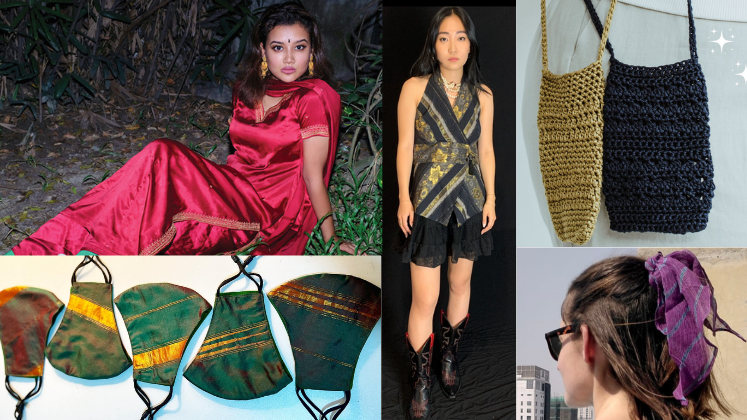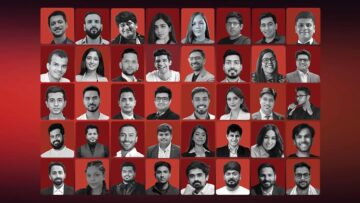In the Western world, rarely are the words ‘sustainability’ and ‘Bangladesh’ mentioned in the same sentence. While the memory of the tragic Rana Plaza disaster, which claimed the lives of 1,134 people, is still vivid, there are limited opportunities for local designers, with the tag of ‘Made in Bangladesh’ often linked with factory-made clothing, rather than designed clothing owing to Bangladesh having earned the title of being one of the leading manufacturing hubs.
But times are changing and recent developments and exposure have led to sustainable fashion design talent emerging in the South Asian region, even though it can be a task discovering them.
Apparel Resources (AR) brings to you five names championing sustainable fashion in Bangladesh context while staying true to the region’s roots and heritage.
Read on to discover.
Anusha Alamgir, Colors.Dhaka
Anusha Alamgir began her journey into the world of fashion by creating video content that showcased different ways to style vintage clothing in order to challenge conventional perceptions of what qualifies as vintage. Her videos resonated so well with young people between the age group of 13 and 25 who were eager to incorporate vintage clothing into their wardrobe, that their positive feedback in turn, inspired her to launch Colors.Dhaka, an online vintage shop on Instagram featuring three distinct categories namely – ’70s funky retro prints, ’90s simpler girlier options and TikTok influencers.
Anusha sources her raw materials from thrift shopping trips abroad, flea markets and sarees and unstitched materials from her mother’s clothing store. Her business model is grounded in the principles of the circular economy, which promote the 3Rs – ‘Reduce, Reuse, Recycle’ to protect the environment.
The brand further adopts eco-friendly packaging practices such as using brown paper instead of dyed paper to minimise their carbon footprint. Additionally, Colors.Dhaka makes use of cellulose-based clear packaging tape.
Anusha feels that despite the numerous benefits of the circular economy, insufficient awareness and evidence-based action remain major barriers to its widespread adoption, and this is something that she aims to tackle with her label.
Afsana Ferdousi, AF
Having been the Senior Product Developer for UK-based brand Next and the Founder of local sustainable brand AF, Afsana Ferdousi is well-versed in the contrasting viewpoints of both fast fashion as well as slow fashion.
Each of Afsana Ferdousi’s collections convey stories that encourage us to be more responsible towards the world we live in. These stories cover topics such as racism, human rights, animal rights and eco-friendliness.
AF champions the values and processes of recycling and upcycling, where waste fabric and yarn from larger garment factories are sourced and repurposed to create new collections. The brand even utilises defective T-shirts from these factories, discarded clothing and applies natural dyes such as indigo and the shibori technique to create new and fashionable high-couture tops.
Afsana Ferdousi’s prior experience of working directly with fast fashion manufacturing units made her understand the importance of being eco-friendly. She acknowledges that she could have imported yarn from other countries or created new T-shirts from scratch, consuming thousands of litres of water, oil, energy and money to produce a similar product that wouldn’t look any different or even better. However, by upcycling and recycling, her conscience stays clear.
To educate customers on the concept of recycling, AF has introduced bespoke designs that incorporate second-hand fabric. Clients can bring in their old clothes, including sarees, which AF will transform into contemporary styles such as jumpsuits or kaftans.
“70 percent of our clothes are made out of upcycling using natural dyes, while the remaining 30 percent are recycled waste from garment factories that have ETP (Effluent Treatment Plants) certificates and maintain GOTS (Global Organic Textile Standard),” Ferdousi stated.
Fathia Tamanna, Dhaka Vintage
Fathia Tamanna runs Dhaka Vintage, an Instagram page dedicated to online vintage shopping. Her sustainable clothing line embraces Bengali culture, which emphasises the 3Rs of the circular economy namely – Reduce, Reuse and Recycle.
According to Fathia, there is a significant contrast between Western and Bengali cultures, where the latter already follows the tradition of repurposing unwanted clothes. Bengali culture does not support a throwaway culture, and even torn cloth is reused for cleaning purposes, with old clothes typically given to household staff.
In an effort to further the ideology and create a community that supports the circular economy by shopping sustainably, Fathia launched Dhaka Vintage to embrace this aspect of Bengali culture, all the while providing a solution to fashion’s notorious waste problem.
Fathia has a keen eye for sourcing the right fit for the label and prefers sourcing from the streets of Dhaka, from backyard sales, from flea markets, wardrobes of countless aunties, from even trash baskets and from leftover material scraps in factories. She has even made clothes from old curtains, believing that ‘anyone’s trash can turn out to be my treasure’. Since a very young age, she started searching for ways to upcycle old materials and received admiration from her loved ones for her innovative approach.
While doing so, Fathia has turned heirloom benarasi sarees into suits, cotton sarees into jumpsuits, using the pallu (border) of old, ruined sarees as patchwork over jackets and curtains and blankets to make sofa covers.
Dhaka Vintage endorses a ‘limited edition’ style and aspires to remain a small business despite how big or popular it might get. For them, mass producing, no matter how ‘sustainably’ it is done, is not a sustainable proposition.
Sinyat Ahmed, Reach Community BD
Sinyat Ahmed, the Founder of Reach Community BD, a social enterprise, has been advocating for sustainable living from a young age. While hosting the first two Ecofest events with her sister in Dhaka, she encountered like-minded people who were selling eco-friendly products, which inspired her to start her own venture. Her initial business idea was to create denim jackets from upcycled clothing.
However, when Covid-19 broke out in Dhaka last year, she decided to alter her business plan and began making reusable and upcycled face masks, which she sold on Instagram.
Reach Community BD is a collaborative platform that showcases the creativity of hobbyists, artists, crafters and individuals through artworks and crafts, such as upcycled, reusable, eco-friendly masks and scrunchies, handmade pottery, canvas artworks and watercolour paints.
The platform currently has 30 artists and 25 members who aim to address the dual crises of Covid-19 and climate change. Reach Community BD seeks to create a more inclusive and environmental-friendly future for marginalised communities, as a result of which, 30 per cent of the sales proceeds are donated to charitable organisations and NGOs working towards achieving the Sustainable Development Goals 2030.
To date, the social enterprise has contributed to more than 10 NGOs and charities in Bangladesh.
Birdsong
Birdsong, an ethical and sustainable fashion company located in the UK, advocates for ‘dressing in protest’ which entails demanding to know the origin of your clothes and the individuals who created them.
All of the makers behind Birdsong are migrant women, with the majority originating from Bangladesh. Birdsong not only pays these women above the London living wage, but the company also has a track record of supporting women’s independence in the workforce in Bangladesh. However, this progress has not been without its obstacles.
Sophie Slater, Co-founder of Birdsong, explains that the brand parted ways with a wholesaler who collaborated with Bangladeshi factories under the Fair Wear Foundation, but failed to pay living wages or address overtime even though it was way better at transparency than a lot of brands.
As Birdsong has only been in operation for seven years, Slater recognises the challenge of needing to know every aspect of the process while also avoiding adding to air miles. Although the company cannot physically visit the factories, it relies on Fair Wage Foundation and industry reports for information.












